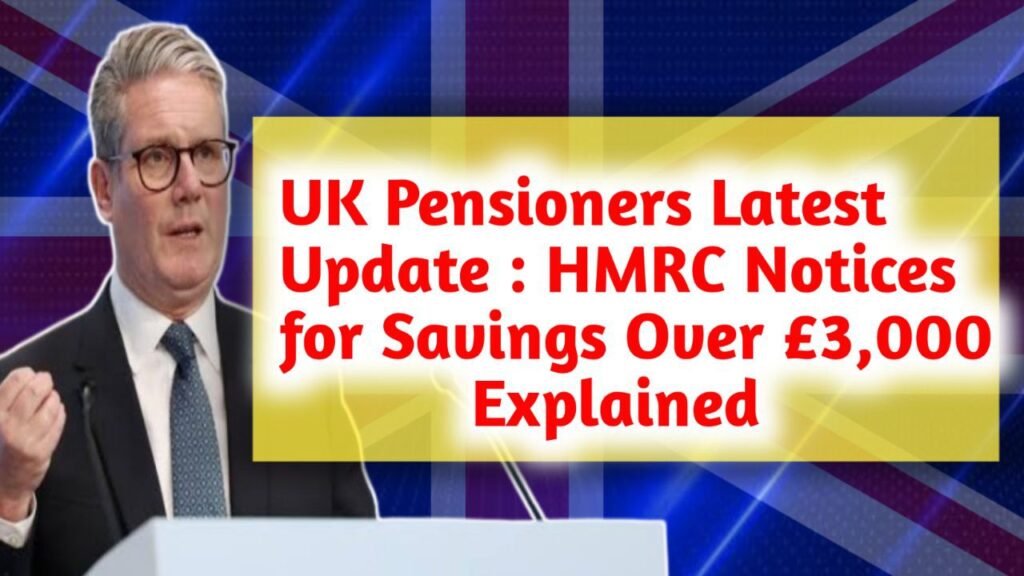For many pensioners in the UK, savings provide a much-needed cushion in retirement. However, the latest communication from Her Majesty’s Revenue and Customs (HMRC) has brought fresh attention to how savings are monitored. Pensioners holding more than £3,000 in savings may now receive official HMRC notices regarding their tax and benefit status.
Understanding these notices is vital. They do not always mean something is wrong, but failing to respond can lead to penalties or unexpected tax adjustments. This guide explains exactly what HMRC notices are, why the £3,000 threshold matters, and what steps pensioners should take to remain compliant.
What Are HMRC Notices?
HMRC notices are formal letters or digital alerts sent to taxpayers when there is an update or concern regarding their finances. For pensioners, these notices often focus on savings, bank interest, and benefit eligibility.
A notice might:
- Confirm a change in your tax code.
- Request details of your savings or investment income.
- Serve as a reminder to provide missing information.
Receiving one should not cause panic. It is essentially HMRC’s way of keeping your tax record accurate.
Why the £3,000 Savings Rule Matters
The £3,000 figure is an important benchmark. While it does not automatically trigger extra tax, it signals when pensioners’ savings may affect benefits like Pension Credit.
- Below £3,000: No action usually required.
- Over £3,000: HMRC may request savings details.
- Over £10,000: The Department for Work and Pensions (DWP) applies the tariff income rule, assuming £1 per week income for every £500 above this limit.
This approach ensures fairness by directing additional support towards those with lower resources.
Types of HMRC Notices Pensioners May Receive
HMRC uses different notices depending on the issue:
- Notice of Adjustment – informs you that your tax code has changed due to savings.
- Request for Information – asks for account details, interest, or investment income.
- Reminder Notice – issued if you have not responded to earlier communication.
Knowing the type of notice you receive makes it easier to take the correct action.
How HMRC Calculates Savings
HMRC calculates savings by reviewing all accounts that generate taxable income. This includes:
- Standard savings accounts.
- Fixed deposits.
- Investments producing dividends.
ISAs (Individual Savings Accounts) remain tax-free, but may still count when assessing entitlement to means-tested benefits. Pensioners should keep accurate records to avoid discrepancies.
Steps to Take if You Receive a Notice
If a notice arrives, here is how to respond effectively:
- Read carefully – Understand what HMRC is requesting.
- Cross-check records – Compare with your bank statements and savings totals.
- Reply before the deadline – Avoid penalties for late responses.
- Seek advice if needed – Tax advisers or financial planners can help.
Prompt and accurate responses protect you from unnecessary stress.
Common Concerns From Pensioners
Do I pay extra tax if my savings exceed £3,000?
Not automatically. HMRC notices usually aim to clarify your tax situation.
Can I ignore a notice?
No. Ignoring correspondence can lead to fines or unwanted tax code changes.
Do ISAs count towards the £3,000 limit?
ISAs are generally exempt from tax but can be considered in benefit assessments.
What happens if I fail to respond?
HMRC may adjust your tax code or reclaim benefit overpayments.
How to Reduce the Risk of Notices
While not all notices can be avoided, pensioners can take steps to minimise them:
- Keep clear records of savings and interest earned.
- Monitor total balances across all accounts.
- Notify HMRC of significant financial changes.
- Consider professional advice for long-term planning.
Benefits of Responding Correctly
Dealing with HMRC notices properly offers clear benefits:
- Avoids penalties for late or missing responses.
- Ensures accurate tax records, keeping your tax code correct.
- Provides peace of mind, knowing you remain compliant.
Key Deadlines
HMRC correspondence always includes a response window. Pensioners should:
- Reply within the stated timeframe.
- Keep copies of letters or online submissions.
- Ensure the information provided is accurate and complete.
Delays can result in automatic changes to your tax record.
Where Pensioners Can Get Help
If you are uncertain about a notice, support is available:
- HMRC Helpline – dedicated support for pensioners.
- Independent Financial Advisers – help structure savings to avoid issues.
- Online HMRC Resources – guidance on savings, allowances, and benefits.
Practical Tips for Managing Savings
To stay organised and reduce stress, pensioners should:
- Track all savings accounts in one place.
- Use ISAs where possible for tax-free growth.
- Consolidate smaller accounts for easier monitoring.
- Review savings strategies regularly to remain under thresholds.
Final Thoughts
HMRC notices regarding savings over £3,000 are not designed to penalise pensioners but to ensure fairness and accuracy in the UK tax system. By keeping savings records updated, responding promptly to notices, and seeking advice when needed, retirees can safeguard their benefits and avoid unnecessary stress.
Staying proactive and informed is the best way to enjoy a secure and stress-free retirement.


